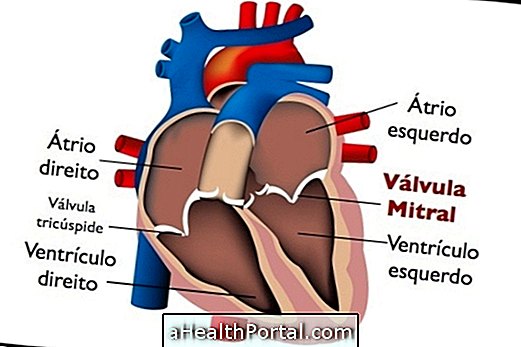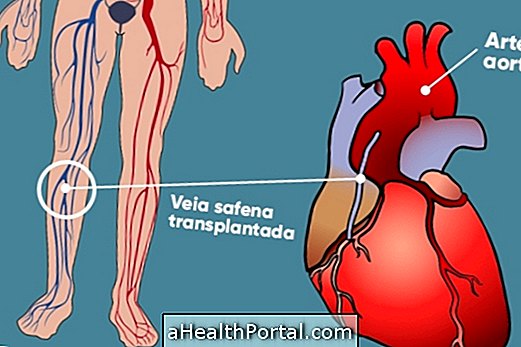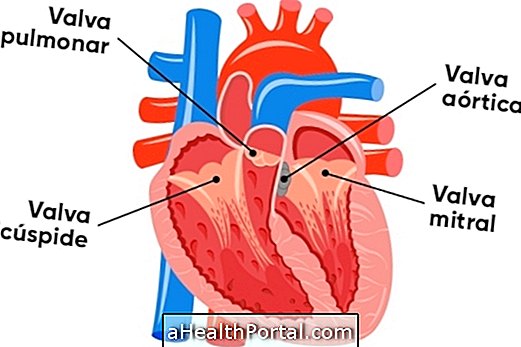Mitral insufficiency occurs when a "piece" of the heart, called the mitral valve, becomes defective, damaging the bloodstream and causing symptoms such as tiredness, shortness of breath, or swelling in the feet and ankles.
In mitral regurgitation, the mitral valve, which allows the passage of blood from the left atrium to the left ventricle, as the image shows, does not close completely, causing a small volume of blood to return to the lungs instead of irrigate the body, as it should.

The circulation becomes more impaired, the more damaged the mitral valve, which normally loses its strength with age, or after a myocardial infarction, for example. However, mitral insufficiency can also be a birth problem. In any case, mitral insufficiency can be treated with medication or surgery.
Symptoms of mitral regurgitation
Symptoms of mitral regurgitation include:
- Shortness of breath, especially when straining or going to sleep;
- Tiredness;
- Cough, especially at night;
- Heart palpitations and fast heart;
- Swelling in the feet and ankles.
In the presence of these symptoms, the individual should consult the cardiologist who listens to the heart using a stethoscope and, if necessary, recommends performing other tests, such as electrocardiogram, chest X-ray or echocardiography to observe the degree of severity of the mitral valve.
Types of mitral regurgitation
Types of mitral insufficiency include:
Mild, minimal or mild mitral regurgitation
Mild, minimal or mild mitral regurgitation is only diagnosed when the doctor hears a different sound when listening to the patient's heart with the stethoscope. It produces no symptoms, is not serious and does not require clinical treatment.
Moderate mitral regurgitation
Moderate mitral regurgitation causes symptoms such as tiredness, for example, but they are not severe and therefore immediate treatment is not always necessary. In these cases, the physician only listens to the patient's heart and prescribes exams, such as echocardiography or chest x-ray to observe the mitral valve and check if mitral regurgitation has worsened.
Severe mitral regurgitation
Severe mitral regurgitation causes symptoms such as shortness of breath, coughing and swelling of the feet and ankles, and therefore it is necessary to treat it with medicines or surgery to correct or replace the valve, depending on the patient's severity and age.
Acute mitral regurgitation
Acute mitral regurgitation may be caused by rupture of the heart muscle due to acute myocardial infarction or infective endocarditis, for example. In this case, surgery may be required to repair or replace the valve.
Chronic mitral insufficiency
Chronic mitral insufficiency can be caused by rheumatic diseases, mitral valve prolapse, mitral valve calcification, or congenital valve deficiency. It is usually progressive and should be treated with medicines or surgery for valve replacement.

Causes of mitral insufficiency
The causes of mitral insufficiency may be:
- Degeneration of the mitral valve itself;
- Coronary disease;
- Rheumatic diseases;
- Infective endocarditis;
- Collagen diseases such as Maritime Syndrome;
- Side effect of medications, such as Phenfluramine or Ergotamine, for example.
In addition, mitral regurgitation may be a birth defect and may occur after an infarct because the mitral valve may be affected, and there is also a greater risk of developing mitral regurgitation if there is a history of the disease in the family.
Treatment for mitral insufficiency
Treatment for mitral regurgitation may be done with drugs such as diuretics, beta blockers or angiotensin converting enzyme inhibitors, although mitral insufficiency can only be cured with cardiac surgery for correction or replacement of the mitral valve.
Learn more about surgery for mitral valve repair in: Valvuloplasty.



















